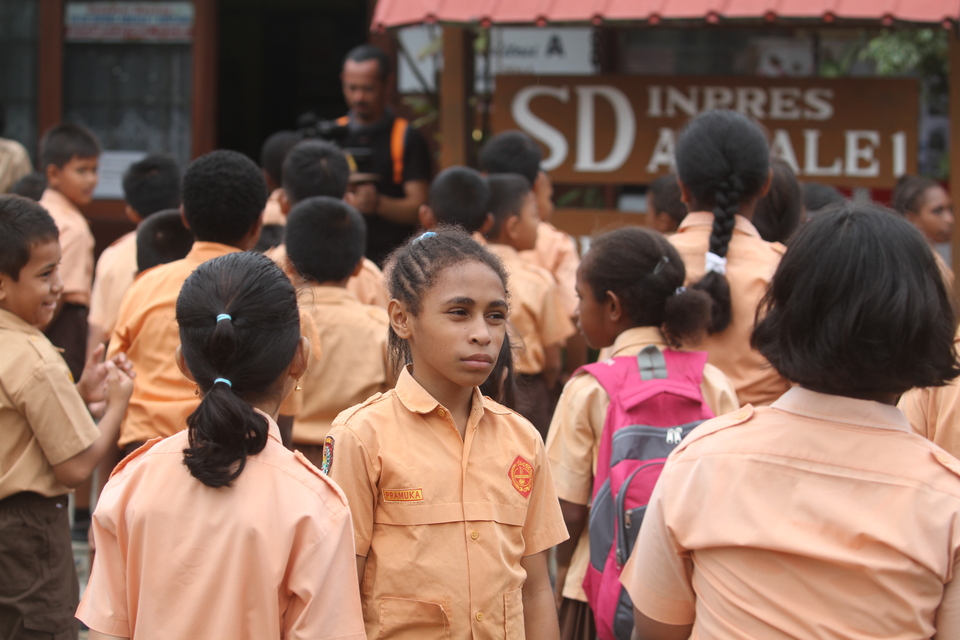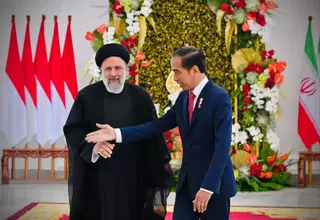Papua Still Faces Massive Education Backlog

Jayapura. Over the past decade, Indonesia has been trying to improve its education system by allocating 20 percent of the state budget for this purpose. There are 62 million students and 3,5 million teachers and lecturers. These massive efforts and numbers, however, fail to guarantee equal distribution and quality.
The education system in the western part of Indonesia is generally much better than in the eastern regions, such as Papua, where many children still do not have access to proper schools.
According to the Central Statistics Agency (BPS), there were 117,529 elementary school students and 39,529 junior high school students in West Papua, and 336,644 elementary school students and 94,897 junior high school students in Papua during the 2013/2014 school year.
The numbers look good, but the truth is far from that.
Economic conditions, culture and geographical accessibility have barred many in the easternmost province from accessing even elementary education. Many people are not aware of the importance of educating their children, or they succumb to economic difficulties and are unable to afford it.
The BPS reported that West Papua and Papua scored the lowest of all Indonesian provinces in the 2010-2015 Human Development Index (HDI). West Papua's HDI was 61.73 and Papua's 57.25, while the Indonesian average stood at 69.55.
The HDI measures average achievements of citizens in terms of human development. The variables include general health and life expectancy, education and living standards.
Besides low HDI scores, the inflation rate in West Papua and Papua is exceptionally high. Children are often forced to abandon their studies to go to work in order to support their families.
"Papuans who live in big cities won't question the importance of education and send their children to school. It's different in rural areas, where they can't go to school because they need to work to help their parents," said Sudarwati, the principal of state-run elementary school Abeale I.
A conservative outlook that sees education as unimportant and an unwillingness to work have resulted in many Papuans leaving urban areas.
"Many Papuan people are too lazy to work. They have been way too comfortable living off natural resources. The locals often get drunk and do not care about education. This is the reason they lose the competition to outsiders and move back to the highlands," said Edi, a former teacher at a Catholic school in Surabaya, East Java, who has been living in Sentani for the past 11 years.
Data from the United Nations Children's Fund (Unicef) shows that 30 percent of Papuan students do not complete their elementary and junior high education. In rural areas, up to 50 percent of elementary school students and 73 percent of junior high school students are dropouts.
Geographical conditions contribute to difficulties in accessing education and to high levels of absenteeism.
School in the City
Schools in Papua's larger cities may not have the same difficulties as those remote areas, but there are still technical and other issues preventing their advancement.
Even at tuition-free Abeale I elementary school, despite its principal's devotion, many students do not receive proper teaching. Sudarwati told the Jakarta Globe that the school needs more good teachers, especially for English and computer classes.
"We have to improve the capacity and quality of teachers in Papua," said Sudarwati, who has been teaching in Papua since 1990.
Not only the quality of teachers, but also the condition of infrastructure is worrying. The premises, built in the 1970s, need to be renovated and an additional two classes have to be built to accommodate the students.
Sudarwati does not give up though. Teaching and learning is her the most important contribution to society.
Education in Remote Areas
However, a ray of hope sometimes appears in the most difficult situations. In the mountainous area of Mamit in Tolikara distict, the Lentera Harapan elementary school is standing strong to provide free and high-quality education to local residents.
Led by Laura Elisabeth Panggabean, the school is determined to provide equal educational opportunities to all children living in the underdeveloped village.
In the beginning, the main obstacle facing Laura and other volunteer teachers in Mamit was not the low living standard or remoteness of the village, but language.
"When the students came for the first time, it was difficult for them to use Indonesian language, because most of them only spoke in their tribal language Lani," Laura said.
With the help of missionaries and volunteers from Mission Aviation Fellowship (MAF), the students are catching up on both formal and informal education. Lentera Harapan school seeks to instill in Mamit's population not only the need for learning, but also hygiene — using toilets and washing hands before eating.
Collaboration between the government and the private sector is needed to develop access to education in remote areas such as Mamit. Papuans who succeed in gaining a proper education need to go back to their hometowns and share their knowledge. Yustus Samber is one of those who did so, by becoming a volunteer teacher at Lentera Harapan school.
Yustus said being a Papuan gives him better access to the local community. He believes education is the means to change the future of Mamit in particular, and Papua in general.
"If we are not the ones to care, who else should? I just hope these kids will bring the change to Mamit," Yustus said.
POPULAR READS
President Jokowi Urges Global Restraint as Tensions Rise in the Middle East
President Joko "Jokowi" Widodo emphasized the importance of diplomatic efforts to prevent the escalation of conflict in the Middle EastKPK Identifies Sidoarjo Regent as Suspect in Corruption Probe
KPK has identified Ahmad Muhdlor Ali as a suspect in a corruption case involving the Sidoarjo Regional Tax Service AgencyEconomic Concerns Overshadow Security Worries for Indonesians in Iran
Indonesian citizens currently in Iran are more concerned about rising inflation than the security situation in the country.'Siksa Kubur' Review: Indonesian Horror with Solid First Act
The beginning part of "Siksa Kubur" is incredibly solid across many fields, including the visual storytelling.IDX Slides 2 Percent as Geopolitical Conflict Rattles Market Confidence
The IDX attributed the subdued performance of the index at the start of the week to the escalating geopolitical tensions in the Middle EastPopular Tag
Most Popular
























